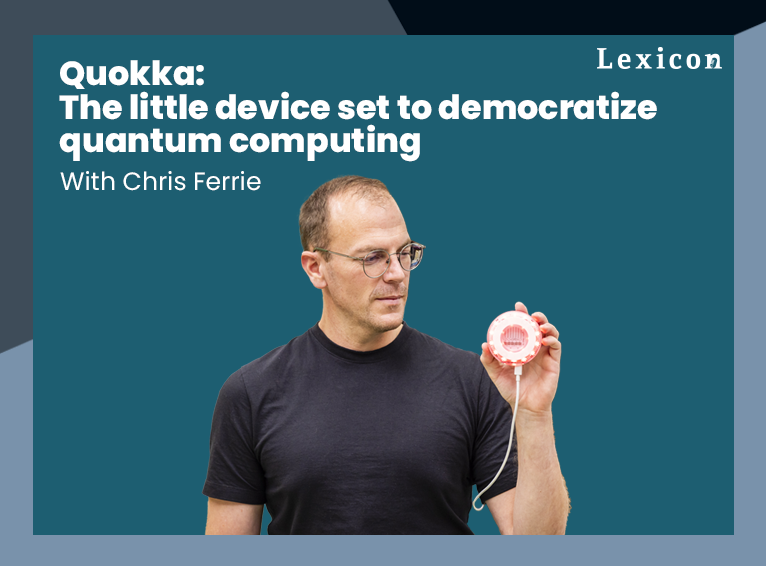In our latest episode of Lexicon, we caught up with Chris Ferrie, an Associate Professor at the University of Technology Sydney and a popular science writer. Chris is also one half of the founding members of Eigen Systems.
We’ve talked about his company’s quantum computer emulator Quokka, which aims to democratize quantum computing education. Let’s find out how.
The team behind the Quokka
Chris Ferrie is on a mission to make quantum computing accessible to a wider audience. Ferrie’s background is diverse and impressive.
He is heavily involved in academic research at the Centre for Quantum Software and Information. He is the author of several books on quantum physics for different age groups, including the bestseller Quantum Physics for Babies.
What is the quokka?
The quokka, named after a photogenic Australian marsupial, is crucial to this mission. On the choice of name, Ferrie explained to IE“If you have a quantum product or company, it has to start with Q or have a Q. And in Australia, there is only one native animal with a Q. That’s why we chose the quokka.”
But behind the interesting name lies a serious device that is intended to close the gap between abstract quantum theory and practical application. Under the hood, Quokka is a quantum computer emulator that simulates a fault-tolerant 30-qubit quantum computer.
Chris explained that Quokka can mimic the behavior of a highly reliable quantum computer, which currently does not exist. It provides users with a platform to experiment with quantum algorithms and programs. Unlike other quantum simulators that run on cloud-based systems, Quokka is a physical device that fits in the palm of your hand. This makes the experience of interacting with quantum computers tangible and immediate.
“My main discovery is that students’ engagement increases when they are given the task of building things rather than simply being taught formulas and technical jargon,” explains Chris.
Quokka embodies this philosophy by allowing users to write and run quantum assembly programs on the device and receive feedback and results in real time. This approach not only makes quantum computing more exciting, but also demystifies a field that is often considered inaccessible.
Ferrie explained IE“One of the most important things about the emulator is that it behaves like a black box, and that’s exactly how a quantum computer behaves. You can’t watch a quantum calculation.”
Why it is important
But as Ferrie pointed out, Quokka is more than just a teaching tool. It represents an important step towards making quantum computing a part of everyday education and literacy.
This concept is difficult to grasp using traditional teaching methods. Quokka is more than just a teaching tool. It represents an important step towards making quantum computing a part of everyday education and literacy.
And it’s important to get early exposure to this technology because quantum computers are poised to revolutionize industries. This will likely include areas such as cryptography, drug discovery, materials science, and financial modeling by solving problems that are currently beyond the capabilities of classical computers.
As Chris pointed out, quantum literacy has been recognised as a priority in educational strategies around the world. However, Ferrie noted: “The approaches to date have not worked. This is also about sustainability.”
Many quantum education initiatives have been short-lived and based on goodwill rather than sustainable models. Quokka aims to change this by providing a permanent, scalable quantum education platform that can be integrated into existing STEM curricula.
Quantum computing for the masses
Ferrie also stressed that Quokka has the potential to serve as a gateway to a deeper exploration of quantum computing.
“You can use quantum computing in Quokka to teach components of existing curricula in all STEM subjects, even if quantum is not mentioned in them. And believe me, quantum will not be mentioned in there for at least 20 years,” Ferrie explained.
By integrating quantum concepts into broader STEM education, Quokka prepares students for a future where quantum computing is a fundamental part of the technological landscape. Another important aspect of Quokka is its potential to inspire innovation.
Ferrie compared the device to the first personal computers, which gave a generation of tinkerers and hackers the ability to explore new ideas and develop groundbreaking technologies.
“We want to enable young innovators, hackers, tinkerers and students to develop something we would never have thought of,” said Ferrie. By making quantum computing more accessible, the quokka could help train the next generation of quantum innovators.
A look into the future
While the Quokka is already making waves in the quantum education community, Ferrie and his team at Eigen Systems have even more ambitious plans for the future. For example, they are actively seeking partnerships with educational institutions, government organizations and philanthropists to make the device accessible to under-resourced schools and communities.
“We would like to make it accessible to underfunded schools and communities that cannot afford an expensive device,” Ferrie explained, emphasizing the team’s commitment to expanding access to quantum education.
As Chris explained, the Quokka is available for $395, which he says reflects the cost of small production runs and the bootstrapping nature of the startup.
However, Ferrie is optimistic that as the project scales up, costs will come down, making the device affordable to a wider audience. In addition to the hardware, Eigen Systems is developing a range of educational content and programming interfaces to support users of all experience levels.
ABOUT THE PUBLISHER
Christopher McFadden Christopher graduated from Cardiff University in 2004 with a Masters in Geology. Since then he has worked exclusively in construction, occupational health and safety and environmental consultancy. He is a qualified and accredited energy consultant, Green Deal Assessor and a practicing member of IEMA. Chris’ main interests range from science and engineering to military and ancient history, politics and philosophy.

